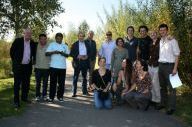Project launched to develop local solutions for future challenges in the Guiana Shield Region, South America

London, 11 October 2011
Indigenous community representatives from the rainforests, savannas and wetlands of Brazil and Guyana travelled to London to attend the launch of the European Union funded COBRA project on 28-30 September 2011. Project partners from Italy, Belgium, Netherlands, United Kingdom, Brazil and Guyana have come together to address the key issues facing local communities and biodiversity conservation across the Guiana Shield Region of South America.
This incredibly important area covers five times the size of Spain. It extends from Colombia in the west to the Brazilian state of Amap? in the east, including the Venezuelan states of Delta Amacuro, Bol?var and Amazonas, all of Guyana, Suriname and French Guiana, and continuing into the Brazilian States of Par?, Roraima and Amazonas. Conservation of the Guiana Shield region is of great importance in the global battle against climate change as it sequesters and stores vast amounts of carbon dioxide. In addition, the region contains 10-15% of the world?s fresh water reserves and an extremely rich diversity of plants and animals, most of which are unique to this region. Most importantly, the region is still largely inhabited by thriving indigenous communities, whose knowledge and skills are indispensable for proper conservation of the region and a great asset to world culture.
There are many threats to the region, its wildlife, people and their culture ranging from unregulated logging, mining and agriculture to government approved mega-projects such as dams and roads. These threats also have a direct impact on us all as the loss of forests and wetlands would have a devastating impact on the planet?s climate as habitat loss accounts for nearly 20% of global greenhouse gas emissions, more than the entire global transportation sector.
New funding opportunities for the governments and people of the region are coming through incentives for low carbon economies and through carbon offsetting funds from industrialized economies. Whether these funds will benefit or threaten the livelihoods of local indigenous communities is not fully understood. The COBRA project will work with local indigenous communities to identify examples of where funding has benefited communities and where natural resource management has been equitable and not been detrimental to local biodiversity or local people.
The project will run for three years allowing the partners to develop a comprehensive understanding of the social, economic and environmental challenges facing the region and how communities are currently dealing with them. The project will apply best practice so local community solutions can be applied to face the threats and opportunities to the wildlife and people of this region.
Sydney Allicock representing communities of the North Rupununi, Guyana said ?this project is vital to allow our people to have the skills, capacity and confidence to engage with national and international governments regarding our future?.
Demetrio Tiriyo representing communities from Apitikatxi, Brazil said ?mining and logging is already threatening our lands and polluting our water. We cannot ignore the outside world, we have to connect with it and create our own path. This project will help us to do this?.
The COBRA project is entitled ?Community Owned Best practice for sustainable Resource Adaptive management in the Guiana Shield, South America?.
The COBRA project partnership includes: Iwokrama International Centre for Rainforest Conservation and Development (Guyana); Institute for Environmental Security (Netherlands and Belgium); IUCN NL (Netherlands); Equipe de Conservacao da Amazonia (Brazil); Politecnico di Torino (Italy); WWT Consulting (UK); Royal Holloway, University of London (UK); and Open University (UK).
The European Union Seventh Framework Programme of funding supports research and innovation. The COBRA project has received funding for 36 months from 1st September 2011 for a maximum amount of EUR 1,895,000.